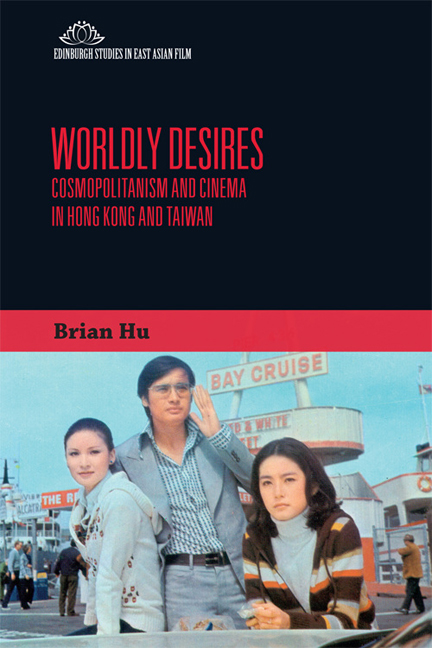Book contents
- Frontmatter
- Contents
- List of Figures and Tables
- Acknowledgments
- Notes on Romanization
- Introduction
- 1 Melodramas of Arrival and Departure: Jet-set Students in 1970s Taiwanese Romance
- 2 ABCs, Mixed-race Stars, and Other Monsters of Globalization
- 3 Setting the Stage: Hong Kong Musical Stars Take on the World
- 4 All the Right Moves: Mobile Heroes and the Shaolin Temple Film
- 5 The Cosmopolitan Brand: Film Policy as Cultural Work in the International Film Market
- Conclusion
- Works Cited
- Index
4 - All the Right Moves: Mobile Heroes and the Shaolin Temple Film
Published online by Cambridge University Press: 04 May 2021
- Frontmatter
- Contents
- List of Figures and Tables
- Acknowledgments
- Notes on Romanization
- Introduction
- 1 Melodramas of Arrival and Departure: Jet-set Students in 1970s Taiwanese Romance
- 2 ABCs, Mixed-race Stars, and Other Monsters of Globalization
- 3 Setting the Stage: Hong Kong Musical Stars Take on the World
- 4 All the Right Moves: Mobile Heroes and the Shaolin Temple Film
- 5 The Cosmopolitan Brand: Film Policy as Cultural Work in the International Film Market
- Conclusion
- Works Cited
- Index
Summary
In the previous chapter, I examined cosmopolitanism as a gendered and ethnicized discourse deployed by film studios to achieve product differentiation and maintain an oligopoly in the transnational Chinese film market. Shaw Brothers and MP&GI branded their female stars as integrated into a world stage via studio-owned media such as films and movie magazines. However, while Shaws and MP&GI could, through their formidable publicity apparatuses, control the discourses of their stars, the studios could not own the concept of cosmopolitanism itself. First, Shaws and MP&GI did not invent Chinese cosmopolitanism; the concept itself is an amalgam of images and sounds inspired by artifacts from other global cultural capitals like New York, Paris, Tokyo, and Shanghai. More importantly, as an effect of various aesthetic properties, the Chinese cosmopolitanism the studios flaunted could be appropriated by other studios, media, or even fans.
In this chapter, I explore this ethnic cosmopolitan as a function of flexible mobile tropes rather than contained studio publicity. Specifically, I want to analyze the emergence in the mid-1970s of a certain cosmopolitan male type: the Shaolin hero. These are the able-bodied young men of the popular Shaolin Temple cycle in Hong Kong and Taiwanese cinema, a spin-offof the wuxia and kung fu cycles popular in the previous two decades. I use the term “mobile trope” in two senses. First, it describes tropes that evoke mobility: characters traveling, objects (such as secret scrolls and martial arts manuals) exchanging hands, cultural institutions (like Shaolin kung fu) becoming unanchored from traditional centers and becoming free to roam in the periphery. Second, it describes the fact that the tropes are not tied to any one producer, studio, genre, industry, nation, or medium. Itself derived from previous heroic ideals and narrative traditions, the trope of this cosmopolitan male hero, having won over the paying audience, is then further appropriated, revised, and spun-offinto and combined with other character types, both male and female, Chinese and non-Chinese. That these tropes are mobile can be explained by economic factors: competing studios, sensing that certain rhetorical conventions have powerful (and profitable) symbolic or narrative effect, develop similar (or cautiously variant) versions of the tropes in their own productions.
- Type
- Chapter
- Information
- Worldly DesiresCosmopolitanism and Cinema in Hong Kong and Taiwan, pp. 143 - 178Publisher: Edinburgh University PressPrint publication year: 2018



